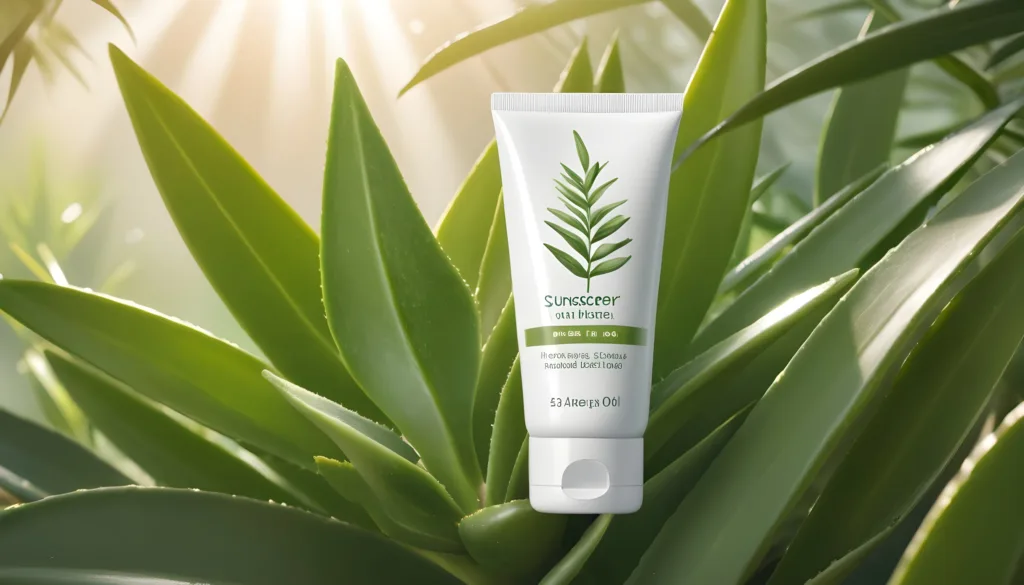Ever wondered why everyone keeps raving about sunscreen? Well, think of it like a superhero cape for your skin! Remember that time you got a sunburn after a day at the beach? Ouch! Those were the sun’s ultraviolet (UV) rays, acting like sneaky villains that damage your skin over time. Sunscreen acts as a shield, protecting you from getting fried by the sun. It’s like wearing sunglasses for your entire face!
But hold on, there are different types of sunscreens, and one kind called mineral sunscreen has been getting some buzz lately. Some people say it might cause pimples. Ugh, no one wants that! So, the question is: can mineral sunscreen cause acne? That’s what we’re here to explore today! We’ll break down the science and figure out the best way to keep your oily skin healthy and happy. Let’s get started!
Table of Contents
Sun’s Out, But Your Skin Stays Protected
Sunshine? We love it! That warm feeling on your skin feels amazing. But hold on, aspiring beach goddess (or god!), before you go full bronze, remember: the sun’s rays pack a hidden punch – damaging UV radiation. That’s where sunscreen steps in, becoming your skin’s ultimate BFF, not just for beach days but for every single day.
Think of sunscreen as a protective shield. It deflects those UV rays that cause not-so-super things like sunburn, wrinkles, and even skin cancer. Want to keep that youthful glow and healthy complexion? Sunscreen is your secret weapon! It’s lightweight, easy to apply, and comes in two main varieties:
- Mineral sunscreens act like tiny mirrors, reflecting UV rays away from your skin. Think of them as a physical barrier!
- Chemical sunscreens absorb UV rays and convert them into heat, which is then released from your skin.
UV rays? More like ‘ugh’ rays, am I right? Sunscreen helps block these ugh rays, so you can enjoy the sunshine without the worry. Ditch the misconception that sunscreen is just a beach essential. Make it your daily BFF for a lifetime of healthy, happy skin!
Mineral Sunscreen: The Good, the Not-So-Bad, and the Acne Mystery ️

Okay, so we talked about sunscreen being your skin’s saviour, but there are different types, remember? Today, we’re focusing on mineral sunscreen. It’s like the OG sunscreen, made with natural minerals like zinc oxide and titanium dioxide. These minerals act like tiny shields, sitting on top of your skin and deflecting those UV rays before they can do any damage. Pretty cool, huh?
Benefits of Mineral Sunscreen: A Win-Win (Most of the Time)
Mineral sunscreen has some awesome perks:
- Broad-spectrum protection: Blocks both UVA and UVB rays, which is important because they’re both wrinkle and sunburn culprits.
- Sensitive skin saviour: Because it sits on top of your skin instead of absorbing into it, mineral sunscreen is often gentler and less irritating, making it a great choice for people with sensitive skin.
How Does Mineral Sunscreen Work Its Magic?
Alright, time for a quick science lesson! Ever wonder how mineral sunscreen pulls off its UV-blocking wizardry? It’s all about that physical barrier! Unlike chemical sunscreens, which absorb UV rays like a sponge, mineral sunscreen forms a protective shield on your skin’s surface. Think of it as Frodo’s Mithril Coat but for the sun! reflecting those pesky rays away before they can wreak havoc on your skin.
Quick Tip: Look for “broad spectrum” on the sunscreen label to ensure it protects against both types of UV rays. Also, opt for a sunscreen with at least 10% zinc oxide or titanium dioxide for optimal coverage
Here’s the thing, though. Some people say mineral sunscreen can clog pores and lead to breakouts. Can mineral sunscreen cause acne? Well, that depends…
Acne Attack! What’s Really Causing Those Breakouts?

Acne. Nobody likes those pesky pimples, whiteheads, or blackheads. And they love to crash the party on special occasions. Like when you’re getting ready for a big day out when suddenly, bam! A wild pimple appears, threatening to ruin your selfie game. But did you know there’s more to acne than meets the eye?
But first, what exactly is acne, anyway?
Acne is basically your skin freaking out a little. Your pores get clogged with oil and dead skin cells, and bacteria can party in there, leading to inflammation and unwanted bumps. There are different types of acne, like:
- Comedonal acne: These are the blackheads and whiteheads you might see on your nose or forehead.
- Inflammatory acne: These are the red, angry-looking pimples that can be tender to the touch.
- Cystic acne: These are the deep, painful bumps that form under the skin.
So, what causes acne? Well, it’s a combination of factors and the list is long and ever-growing like:
- Hormones: Changes in hormone levels during puberty can trigger acne breakouts.
- Genetics: If your parents had acne, you’re more likely to get it too.
- Diet: Sugary or greasy foods might contribute to breakouts for some people.
- Stress: Feeling stressed can make acne worse.
- Sleeping with Makeup: Clogged pores are a recipe for breakouts, and leaving makeup on overnight can trap dirt, oil, and dead skin cells, leading to pimples.
Running low on makeup remover? No worries! I’ve shared some nifty tricks in my latest post on how to bid adieu to makeup without it.
Could Your Sunscreen Be the Smooth Criminal?
Ah, sunscreen—the unsung hero of skincare or the secret saboteur behind your breakouts? It’s a question that’s plagued sunscreen lovers for ages. Here’s the thing: some people think sunscreen itself causes acne. Not exactly! While sunscreen can’t directly create acne, there are a couple of ways it might be involved:
- Comedogenic ingredients: Some sunscreens, especially older formulas, contain ingredients that can clog pores. These ingredients are called “comedogenic,” which basically means “pore-clogger.”
- Heavy formulas: Thick, greasy sunscreens can feel heavy on the skin and trap sweat and oil, potentially leading to breakouts.
Quick Tip: Look for “non-comedogenic” or “oil-free” on the sunscreen label to help avoid clogged pores.
So, can mineral sunscreen cause acne? It depends on the specific formula. We’ll explore that detective work in the next section!
Mineral Sunscreen Myths: Busted Again!

So we know sunscreen itself doesn’t cause acne, but what about mineral sunscreen specifically? There are a few myths floating around, so let’s get our detective hats on and debunk them!
Myth #1: Mineral Sunscreen is a Pore-Clogging Culprit
This one’s a common misconception. People think the minerals in mineral sunscreen, like zinc oxide and titanium dioxide, sink deep into your pores and clog them, leading to breakouts. But here’s the thing: these minerals sit on top of your skin, acting like a physical barrier against UV rays. Think of them like tiny security guards, keeping the bad guys (UV rays) out without messing with your pores!
Quick Tip: If you’re still worried about clogged pores, look for mineral sunscreens labelled “non-comedogenic” or “oil-free.”
Myth #2: Zinc Oxide is the Acne Villain (Not True!)
Zinc oxide is a superstar ingredient in many mineral sunscreens. But some people worry it can cause breakouts. Here’s the good news: research suggests zinc oxide actually has anti-inflammatory properties, which can help reduce redness and calm existing acne. Plus, studies haven’t shown it to be comedogenic.
So, zinc oxide is more like a friend to your skin, not a foe!
Quick Tip: When choosing a mineral sunscreen, opt for products labelled “dermatologist-tested” or “hypoallergenic” for extra peace of mind.
Myth #3: Titanium Dioxide is a Sensitive Skin Irritant
Titanium dioxide is another key player in mineral sunscreens. Some folks with sensitive skin might be concerned it can irritate their skin and lead to breakouts. While there can always be individual sensitivities, research shows titanium dioxide is generally safe and well-tolerated, even for people with acne-prone skin.
In fact, some studies suggest titanium dioxide might even have some calming effects on the skin!
Quick Tip: Remember to patch-test new products on a small area of your skin before slathering them all over to ensure compatibility.
So, there you have it! These mineral sunscreen myths have been busted. But wait, there’s more to our burning question: can mineral sunscreen cause acne? So stick around.
Finding Your Perfect Match: Sunscreen for Acne-Prone Skin

So now we busted the myths about mineral sunscreen and acne. Sunscreen is super important, no ifs, ands, or buts! But sometimes, after you slather it on, you might notice a few unwelcome visitors on your face – pimples! So, can mineral sunscreen cause acne?
Hold on! Not always! Here’s the thing: some sunscreens, especially older ones, can clog your pores, which can lead to breakouts. That’s why it’s important to find a mineral sunscreen that’s made for acne-prone skin. But with all these options out there, how do you find the right sunscreen? Let’s be sunscreen detectives together!
Mission #1: Find the Non-Comedogenic Crew ️
The first thing to look for is a sunscreen labelled “non-comedogenic” This basically means it’s formulated not to clog your pores. But wait, what exactly does that mean? Well, my friend, it’s simple—non-comedogenic sunscreens are specially formulated to keep those pores clear and free from clogs. No more acne ambushes here! Here’s how to spot ’em:
Spotting the Signs of Non-Comedogenic Sunscreens
- Look for labels that proudly boast “non-comedogenic” or “won’t clog pores.”
- Scan the ingredients list for acne-friendly superstars like zinc oxide and titanium dioxide.
- Steer clear of heavy oils and greasy additives that can suffocate your skin and trigger breakouts.
If you’re on the hunt for a non comedogenic moisturizer that won’t clog those pores, check out my other post where I spill all the deets on finding the perfect match for your oily skin!
Quick Tip: Check the ingredients list too! Avoid ingredients like coconut oil, cocoa butter, and mineral oil, as these can be comedogenic for some people.
Mission #2: Fragrance-Free is the Way to Be
Now, let’s talk fragrance—while it may smell oh-so-divine, it’s not always a friend to sensitive or acne-prone skin. Fragrance can irritate sensitive skin and potentially worsen acne breakouts. So, stick with fragrance-free sunscreens whenever possible.
Why Go Fragrance-Free?
- Fragrance-free sunscreens are less likely to cause irritation or allergic reactions, making them a safe bet for sensitive skin.
- By skipping the added scents, you’re minimizing the risk of triggering acne flare-ups—cue the clear skin celebrations!
Quick Tip: Look for sunscreens labelled “hypoallergenic” for an extra layer of assurance against potential skin irritants.
Mission #3: Lightweight Lotions or Sheer Sprays?
Okay, so you’ve narrowed it down to mineral sunscreens that are non-comedogenic and oil-free. Now comes the fun part – picking the texture you like best! Here’s a breakdown of two popular options for acne-prone skin:
Why Choose Lotions
These are classic sunscreens that come in a bottle and are applied by rubbing them onto your skin.
- Look for: Lightweight formulas with words like “ultra-light” or “oil-free” on the label. These will feel less greasy and absorb quickly.
- Bonus points: Some lotions even have a mattifying effect, which helps control shine throughout the day.
Why Go For Sprays
Sprays are a great option if you don’t like the feeling of lotion on your face. They’re super convenient and easy to apply, especially for areas like your ears and neck.
- Heads up: Make sure to hold the spray at least an arm’s length away from your face and spray evenly, then rub it in gently. You want to make sure you get good coverage!
- Not all sprays are created equal: Some sprays can feel a little drying, so look for ones labelled as “hydrating” or “water-resistant” if you have dry or sensitive skin.
Quick Tip: No matter which texture you choose, make sure to reapply sunscreen every two hours, especially if you’re sweating or swimming.
So, while sun protection is the main priority, finding sunscreen with these bonus ingredients can be a win-win for your skin! Remember, the best sunscreen is the one you’ll actually use every day. Don’t be afraid to experiment and find a formula that feels good on your skin and keeps you protected.
Mission #4: Bonus Points for Skincare Superstars
Last but not least, let’s talk about those little skincare superheroes that pack an extra punch—think niacinamide, hyaluronic acid, and other acne-fighting ingredients! These powerhouses not only provide sun protection but also work overtime to keep those breakouts at bay:
- Niacinamide: This superstar ingredient can help reduce inflammation and control oil production, both helpful for acne-prone skin.
- Hyaluronic acid: This keeps your skin hydrated, which can actually help prevent breakouts. Think of it as giving your pores a reason to stay calm and not overproduce oil.
Why Add Extra Ingredients?
- Niacinamide helps regulate oil production and soothes inflammation, making it a must-have for acne-prone skin.
- Hyaluronic acid delivers a surge of hydration without clogging pores, keeping your skin happy and hydrated all day long.
If you’re on the hunt for the best face sunscreen for oily skin, check out my latest post where I spill all the secrets on keeping your skin protected without the greasy feeling.
Quick Tip: Look for sunscreen products that multitask by combining sun protection with acne-fighting ingredients for maximum skincare benefits!
Wrap-Up: Can Mineral Sunscreen Cause Acne?
Phew! We covered a lot of ground today. Remember, sunscreen is your skin’s best friend, can mineral sunscreen cause acne? Not necessarily! We discovered that the answer isn’t as straightforward as it seems. While mineral sunscreen is generally safe for acne-prone skin, it’s essential to choose the right formula tailored to your skin’s needs.
Next up, we delved into the world of sunscreen selection, from non-comedogenic options to fragrance-free favourites. Armed with our newfound knowledge, we’re ready to conquer that sunscreen aisle like pros!
But here’s the thing —sunscreen isn’t just a skincare staple; it’s a superhero in a bottle! Whether you’re battling breakouts or basking in the sun’s glow, sunscreen is your first line of defence against skin damage and premature ageing.
So, here’s my challenge to you: the next time you reach for that sunscreen bottle, pause for a moment and ask yourself, “Am I making the best choice for my skin?” With a little know-how and a dash of sunscreen savvy, you’ll be well on your way to achieving that clear, radiant complexion you’ve always dreamed of!
FAQs
Q: Can mineral sunscreen cause acne?
A: Not necessarily! Mineral sunscreens themselves aren’t inherently comedogenic (pore-clogging). However, some older formulas or those containing comedogenic ingredients may clog pores and contribute to breakouts. By choosing a non-comedogenic, fragrance-free mineral sunscreen formulated for acne-prone skin, you can minimize the risk of breakouts.
Q: What ingredients should I avoid in sunscreen if I have acne-prone skin?
A: Look out for ingredients like coconut oil, cocoa butter, and mineral oil, as these can be comedogenic for some people. Additionally, be wary of heavy thickeners and chemical UV filters, which can trap sweat and oil under the skin, potentially leading to breakouts.
Q: Should I use a fragrance-free sunscreen?
A: Yes, especially if you have sensitive or acne-prone skin. Fragrance can irritate the skin and potentially worsen breakouts. Even if you don’t have sensitive skin, fragrance-free is a great option to avoid any unnecessary ingredients.
Q: Are there any mineral sunscreens with ingredients that can help fight acne?
A: Yes! Some sunscreens contain ingredients like niacinamide and hyaluronic acid, which can be beneficial for acne-prone skin. Niacinamide can help reduce inflammation and control oil production, while hyaluronic acid keeps your skin hydrated, which can actually help prevent breakouts by preventing dry, irritated skin that overproduces oil.
Q: I have very oily skin. Can I still use mineral sunscreen?
A: Absolutely! Look for mineral sunscreens labelled “oil-free” or “non-comedogenic” to ensure they won’t clog your pores. There are many lightweight, oil-free mineral sunscreens available that are perfect for oily skin types.
Q: Should I use a chemical sunscreen instead of a mineral sunscreen if I’m worried about breakouts?
A: While some people with acne-prone skin find success with chemical sunscreens, it’s important to choose one that’s oil-free and non-comedogenic. Chemical sunscreens can sometimes irritate sensitive skin, so a mineral sunscreen might be a better option for those with both acne and sensitive skin concerns. Ultimately, the best way to find the right sunscreen is to try a few different types and see what works best for your skin.
Q: Is it okay to skip sunscreen on cloudy days?
A: No! UV rays are present even on cloudy days, and they can still damage your skin. Make sure to wear sunscreen every single day, year-round, regardless of the weather.



Leave a Reply